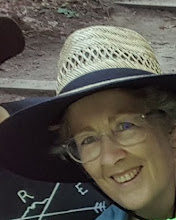They think of the dangdest things here . . .
I'd not seen one of these before. It's in the bathroom stall. You strap your young'un to it so you can set a spell in peace. Wrigley's gum is made in Chicago and the Illinois SLA has 500 packs of it to pass out. And apparently McCormick Place is famous for several dancing fountains. Here is another:
http://www.youtube.com/watch?v=mniFFtW17TY&feature=plcp
It's been a learning experience on multiple levels. Oh, and it Guy Sinclair, not St. Claire. I was tired last night.
Mary Ellen Bates spoke again this morning as my 8a session. Her title was From Info Pro to Info Hero: Five ways to turn info into insight. It was an excellent expansion of her 15 minute presentation last night. My instructor, Ellen Dickey, at CCCC put me on to Mary Ellen years ago and I've watched her with interest. Apparently so have many others. You can see from the pix that it was standing room only. She talks about how important it is to add value to your work by asking these questions during the reference interview:
- How could I make this more useful to you?
- What can I do to help you accomplish that?
- What else can I do to make this more valuable?
She says to be a taste pushy and use the marketing tool FUD if necessary (Fear, Uncertainty, and Doubt)--by asking quietly, "You used Google for THAT?!" and follow up with "Could I send you what I would have found?" if needed.
She says each reference report needs to begin with a statement of the question and then, "Interestingly, I found that . . ." by highlighting what was important and also where there were gaps. She also urges using visuals as often as possible, lots of white space, and offering to use the client's template if it is helpful. She emphasized again that the format of the results should reflect the quality of the work--ie. like not wearing flip flops to a job interview.
She suggests three word cloud generators as a great way to emphasize aspects of the results (with some weeding of the obviously overstated words).
- wordle.net
- worditout.com
- tagxedo.com
And she says if you are doing something for the first time and are a bit uncertain, tell you client you'll do a beta version and see how it comes out. Most folks get that and will accept that response.
The 11a session on KM Across the Health Care Spectrum was not so helpful. Mostly the three panelists emphasized that the KM terminology is murky and success with KM initiatives in HC settings, which often have a lot of turnover, are culturally dependent and a Sisyphean task. One noted that it takes 17 years to ingrain a new best practice in patient care and that while 94% of businesses recognize the need for KM, 70% of KM initiatives fail. I am bringing home a bibliography of recommended readings but two books were particularly called out and Kerry may want to look into ordering them if we don't have them:
- Bennis: Tribal Leadership
- Rearden: It's All Politics
I'm pretty burned out at this point--four days of listening to folks struggling with developing professional recognition in an ungrateful world (after four years of graduate school emphasizing the same) is wearing thin.
I skipped the 60 Apps in 60 Minutes mostly because we don't use a lot of apps and we probably were only interested in about 8 of the 60 Web Sites in 60 Minutes and I wasn't sure how much more I could get in my head. I'll hit the Cochrane Reviews session at 4p and that's it for today. One or two sessions tomorrow and I'm off for Ft. Wayne.
 Indianapolis Museum of Art
Indianapolis Museum of Art Intergenerational Communication and MEBates again on Marketing for Introverts
Intergenerational Communication and MEBates again on Marketing for Introverts The Cochrane Collaboration
The Cochrane Collaboration
.JPG)





